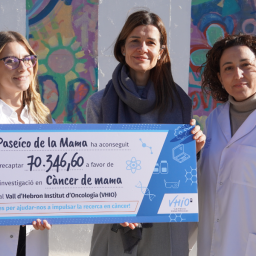
- Presented at the 2023 ESMO Breast Cancer Annual Congress, 11-13 May in Berlin, final results of the SOLTI-TOT-HER3 window of opportunity trial (1) show that lower dose patritumab deruxtecan (5.6 mg/kg versus the previously tested 6,4 mg/kg dose) in HER2- breast cancer reduces toxicity in patients without compromising treatment efficacy.
- The lower 5.6mg/kg dose led to an equally clinically meaningful response rate of 32%, increased immune infiltration and reduced cell proliferation with less secondary side effects in
- Co-led by Mafalda Oliveira, Senior Consultant at the Vall d’Hebron University Hospital’s Medical Oncology Department and Clinical Investigator of the Vall d’Hebron Institute of Oncology’s (VHIO) Breast Cancer Group, SOLTI-TOT-HER3 is the first study to evaluate HER3 directed antibody-drug conjugate patritumab deruxtecan in patients with early hormone-sensitive HR+/HER2- breast cancer.
Reported at the 2023 European Society for Medical Oncology’s (ESMO) Breast Cancer Annual Congress, 11-13 May in Berlin, results from part B of the TOT-HER3 window of opportunity trial (1) led by the SOLTI Breast Cancer Research Group show that lower dose treatment with HER3 directed antibody-drug conjugate (ADC) patritumab deruxtecan —5.6 mg/kg versus the previous 6.4 mg/kg dose administered in part A of this study— reduces toxicity without compromising efficacy in patients with early HER2-negative breast cancer.
This multi-center Spanish study, directed by Aleix Prat, Head of Translational Genomics and Targeted Therapeutics in Solid Tumors at the August Pi Sunyer Biomedical Research Institute (IDIBAPS) in Barcelona, and Mafalda Oliveira, Senior Consultant at the Vall d’Hebron University Hospital’s Medical Oncology Department, Clinical Investigator of the Vall d’Hebron Institute of Oncology’s (VHIO) Breast Cancer Group, is the first to evaluate ADC patritumab deruxtecan in patients with early hormonal receptor-positive/HER2-negative (HR+/HER2-) breast cancer.
Results of part A of this study, that were presented at the 2022 ESMO Breast Cancer Congress, 3-5 May in Berlin, previously showed that just one dose of 6.4 mg/kg of patritumab deruxtecan in 78 treatment-naïve patients led to high antitumor activity and tumor shrinkage in 45% of these women, as well as increased immune infiltration and reduced tumor cellularity.
“Results of part B of this study show that the reduced 5.6 mg/kg dose achieves an equally clinically significant response rate of 32%—independent of the hormone-receptor status—, increased immune infiltration and reduced cell proliferation with less side effects, hepatic and hematological toxicities in particular, without compromising treatment efficacy in patients,” observes Mafalda Oliveira, co-Principal Investigator of the SOLTI-TOT-HER3 study and member of SOLTI’s Board of Directors, who presented this data during a Proffered Paper Session (1) at the Congress.
“Prior to this study, patritumab deruxtecan had only demonstrated anti-tumor activity and a tolerable safety profile in patients with heavily pretreated metastatic high or low HER3 expression levels,” adds Oliveira.
“Results of part B support the high antitumor activity reported in part A. Our observations have led to the development of additional studies that have been designed to evaluate patritumab deruxtecan in other early-stage disease settings, including the SOLTI-VALENTINE study,” says SOLTI’s President Aleix Prat, and co-Principal Investigator of the SOLIT-TOT-HER3 study.
The SOLTI-VALENTINE study, also co-led by Aleix Prat and Mafalda Oliveira, will evaluate the efficacy of this ADC as monotherapy or in combination with endocrine therapy versus classical neoadjuvant chemotherapy in high-risk HR+/HER2- early breast cancer breast cancer. The design of this new study was also presented by Mafalda Oliveira at the same Congress during a Poser Viewing Session (2).
“Our present findings also open up potential new avenues for the treatment of triple-negative disease. Identifying new therapeutic options for this breast cancer subtype represents an unmet clinical need. Considering that triple-negative tumors express very low levels of the HER3 protein, we previously thought that HER3-targeted therapy such as patritumab deruxtecan would show limited efficacy. We have now observed the contrary,” adds Mafalda Oliveira.
The high activity data led to the expansion of the study (part B) to include 17 patients with triple-negative disease and 20 more patients with HR+/HER2- tumors, to evaluate the lower dose of 5.6mg/kg.
The second presentation from the SOLTI TOT-HER3 trial at the same meeting involved data from correlative analysis of part A (3), evaluating the association between early response to patritumab deruxtecan and HER2 expression levels.
“TOT-HER3 has allowed us to molecularly characterize tumors and identify the biological characteristics at the time of starting treatment to help predict which patients would most likely benefit from treatment with patritumab deruxtecan. Based on this analysis, we have observed that HER2 levels may be a predictor of response to this antibody-drug conjugate,” says Aleix Prat.
“Measuring RNA, DNA and protein expression our data show that low HER2 expression correlates with a higher response. Our results could ultimately help to better guide treatment decision making,” adds SOLTI’s Scientific Director Tomás Pascual.
The TOT-HER3 study is a paradigmatic example of how a drug that has already been tested in the metastatic setting can be evaluated efficiently in early-stage disease and therefore extend its potential as a therapeutic option for patients with treatment-naïve breast cancer.
“Window of opportunity studies such as TOT-HER3, do not delay drug development and can generate additional, valuable insights. The TOT-HER3 study concept could be applied to assess many other drugs especially in breast cancer, where there are many drugs for all subgroups of patients that are currently being tested in clinical trials for metastatic disease. The next step is to see if we can also evaluate these therapies in early-stage settings,” concludes Aleix Prat.
Led by the SOLTI Breast Cancer Research Group, TOT-HER3 included 115 patients across 10 Spanish hospitals and was carried out in collaboration with the pharmaceutical company Daiichi-Sankyo.
###
References:
- Proffered Paper Session 2: Best abstracts, 12.05.2023, h. 16:45 – 18:15, Berlin Hall. 124O – Oliveira M, et al. Patritumab deruxtecan (HER3-DXd) in hormonal receptor-positive/HER2-negative (HR+/HER2-) and triple negative breast cancer (TNBC): results of part B of SOLTI TOT-HER3 window of opportunity trial. ESMO Breast Cancer 2023, Abstract 124O. Ann. Oncol. (2023) 8 (1suppl_4): 101220-101220. 10.1016/esmoop/esmoop101220.
- Poster viewing and lunch, 12 May 2023. 155TiP – Oliveira M, et al. A randomised phase II trial of neoadjuvant multi-agent chemotherapy (CHT) OR patritumab deruxtecan (HER3-DXd; U3-1402) +/- endocrine therapy (ET) for high-risk hormone receptor-positive (HR+/HER2-) early breast cancer (EBC): SOLTI-2103 VALENTINE trial. Ann. Oncol. (2023) 8 (1suppl_4): 101220-101220. 10.1016/esmoop/esmoop101220.
- Mini Oral Session 2, 12.05.2023, h. 08:45 – 10:15, Berlin Hall. 3MO – Brasó-Maristany F, et al. HER2 expression and early response to patritumab deruxtecan (HER3-DXd) in early-stage hormone receptor-positive/HER2-negative (HR+/HER2-) breast cancer (BC): a correlative analysis from SOLTI-TOT-HER3 trial. ESMO Breast Cancer 2023, Abstract 3MO. Ann. Oncol. (2023) 8 (1suppl_4): 101218-101218. 10.1016/esmoop/esmoop101218.



















